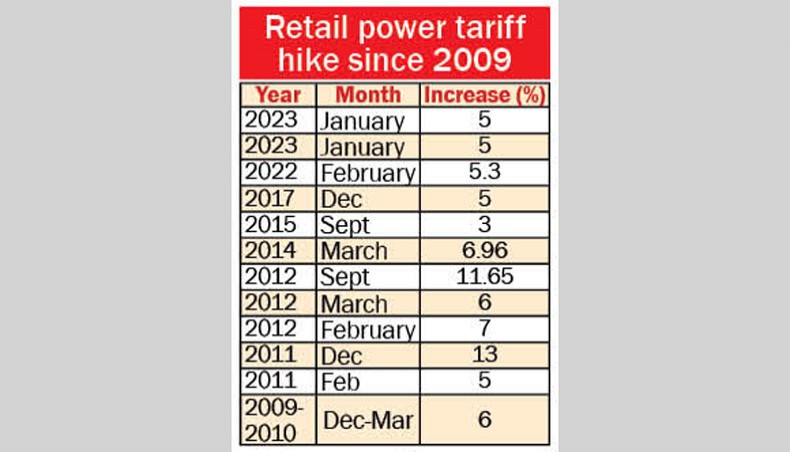
BD hikes power price again in less than three weeks

The government has increased the retail power price again — by 5 per cent — along with an increase in the bulk price by over 8 per cent just 18 days after it had hiked the retail price on January 12 this year.
The new retail prices and charges, announced for all 23 consumer categories, will be effective from February 1, said a gazette notification published on Monday but made available on Tuesday.
With the latest hike, the retail electricity price has gone up by 113 per cent since 2009, when the incumbent AL-led government assumed power and this was the 12th time during the period the price was hiked at the retail level.
The per unit (one kilowatt-hour) retail electricity tariff rose to Tk 4.14 from Tk 3.94 for the minimum-use consumers, the notification said.
The government increased the bulk power price by 8.06 per cent, Power Division secretary Habibur Raman said on analysing another gazette notification also issued on Monday.
No average retail and bulk power price hike per unit was mentioned in the gazette notifications.
The average price of each unit of electricity rose to Tk 7.49 from Tk 7.13 with the previous hike on January 12, said officials at the Power Development Board while the gazette notification on that hike also said nothing about the average price.
Earlier on November 21, 2022, the Bangladesh Energy Regulatory Commission increased the average bulk electricity price by 19.92 per cent with effect from December.
Asked if there was any alternative to increasing the power price, secretary Habibur said, ‘I will not make any comment in this regard.’
Both retail and bulk electricity prices have been readjusted under the authority vested in Section 34 (ka) of the Bangladesh Energy regulatory Act, 2003, the gazette notifications said.
The government recently amended the BERC Act empowering the Power Division to raise the power, gas and petroleum fuel prices using administrative power any time it wants.
Resorting to the amended law, the new gazette notifications were issued on Monday to raise the electricity tariff at the bulk and retail levels, bypassing the authorities of the energy regulator.
According to energy expert Mohammad Tamim, the entire power sector depended on import and the government had no other option as the energy price is high on the global market.
‘The government did not try to explore gas and lift coal in our country. Inflation will increase further as the opportunists businesses will increase prices and people will have to pay the price,’ he said.
The government last raised the retail price of electricity by 5 per cent on January 12, 2023.
Economists feared that the power price hike would further stoke inflation and lower-income people will suffer the most.
Former Bangladesh Bank chief economist Mustafa K Mujeri told FP that the power price hike would increase the inflation further and create more adverse impact on the lower-income group in the country as they had already been struggling to cope with the price hike of essentials.
‘The IMF always gives some written and unwritten conditions in providing loans. They always discourage subsidy. There is some link between the $4.7 billion IMF loan and the power price hike,’ he said.
He thought that the government had no other option but to raise the power price considering the current economic situation.
Consumers Association of Bangladesh president Ghulam Rahman said that the government had increased the power price in an non-transparent way and the CAB did not support it.
‘Inflation will increase further and the woes of people would multiply due to the power price hike. The government does not care about people’s welfare and it is fulfilling the IMF conditions for getting the loan,’ Ghulam Rahman explained.
Earlier, State Minister for Power, Energy and Mineral Resources Nasrul Hamid said that from now on the electricity price would be adjusted in the first week of every month, state-run news agency Bangladesh Sangbad Sangstha reported.
The government, in an executive order, on January 18 increased the retail piped gas prices in four consumer categories by up to 179 per cent with effect from February 1.
Four other consumer categories — household, fertiliser, tea industry and compressed natural gas — did not see any change in their rates but were bracing for multiple impacts from the price hike.
Businesses said that the frequent gas and electricity price hikes were creating instability in doing business.
They also feared the closure of factories in the days to come.
Bangladesh Knitwear Manufacturers and Exporters Association executive president Mohammad Hatem told FP that the costs of all raw materials and of manufacturing would increase due to the power price hike.
Editor & Publisher: S. M. Mesbah Uddin
Published by the Editor from House-45,
Road-3, Section-12, Pallabi, Mirpur
Dhaka-1216, Bangladesh
Call: +01713180024 & 0167 538 3357
News & Commercial Office :
Phone: 096 9612 7234 & 096 1175 5298
e-mail: financialpostbd@gmail.com
HAC & Marketing (Advertisement)
Call: 01616 521 297
e-mail: tdfpad@gmail.com